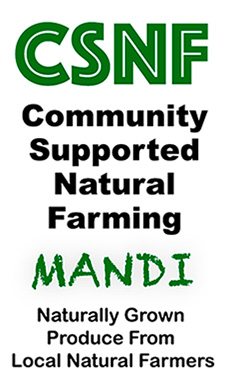Agriculture is the primary source of livelihood for almost ½ of the Indian workforce. The current system of agriculture in India that has dominated most of Indian farming is that of monocropping using hybrid seeds with intensive use of chemical fertilizers and pesticides in order to drive up yields and reduce losses due to pests. This system became widespread after the advent of the Green Revolution and for a few decades resulted in growth of yields as well as increase of farm incomes. In the last decade or so, however, we have seen incomes stagnate and even shrink, accompanied with a large rural-urban migration as farming becomes unviable for many households.
In this case study we explore the problems afflicting the agriculture sector, we propose an alternative model of farming called Community Supported Natural Farming, and present some of the early results of the CSNF model as implemented by farmers in Jhajhar district Haryana with the support of the Heritage Experiential Learning School and Disha India Education Foundation, and a small group of volunteers.
The CSNF model - Community Supported Natural Farming
Core principles
- Farmers commit to practice natural farming and demonstrate commitment through certification - such as the PGS certification in Haryana for ZBNF (Zero Budget Natural Farming) farmers.
- We work with small farmers that are representative of typical agricultural households in India.
- We focus on local and seasonal produce using native seeds.
- Growing local produce that is well suited to the ecology of the area makes it easier to grow in harmony with nature, requiring less external inputs.
- Growing crops that are in season allows for maximum growth as the crops are well suited to the local climate.
- Native seeds have natural resistance against seasonal and local pests and diseases.
- Transparent process with all proceeds of sales going to the farmers.
- Transparent process with all proceeds of sales going to the farmers.
- Build community support for farmers to encourage them to move away from chemical farming
- CSNF provides a supportive community, a market for their goods and an alternative model for success.
Main challenges for the CSNF model
- Access to markets for natural farmers
- Low yields of naturally grown produce
- Availability of high quality seeds
- Education and awareness for consumers to understand the importance of natural produce and buying from local farmers
RECOMMENDATIONS
- 1.Create a market for local, seasonal farm produce
- 2.Support farmers in upskilling and technology investments
- 3.Use of indigenous varieties better suited to the climate
- 4.Encourage multi-cropping, crop rotation and diversification
IMPLEMENTATION
1.Farmers Market
- a.There is a weekly mandi held at the HXLS campus open to the public and promoted to all the Heritage families.
- b.At the beginning of the month, orders are collected through a web form through Whatsapp groups created for CSNF members and supporters and sent to the farmers. Farmers prepare and package the orders which are delivered at home throughout Gurgaon on the first Saturday of the month.
- c.We tap into the wider natural farming community and bring in other products - mango, sweet lime, pomegranate which have seasonal demand and generates interest and enthusiasm
2.Farm Visits
- a.Regular farm visits are organized - CSNF community is encouraged to participate and see the practices in action. We suggest improvements in planning, hygiene, multi cropping and other practices.
- b.We try to understand the farmers problems and work with them to remove blockers

 Ram Kishan
Ram Kishan Anil Kumar
Anil Kumar Rahul
Rahul Suman
Suman